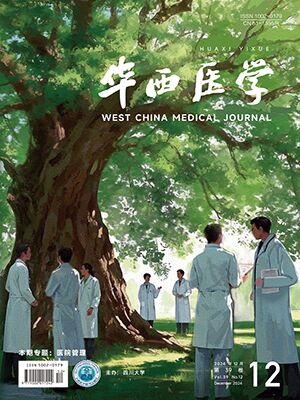| 1. |
Martinez FD, Vercelli D. Asthma. Lancet, 2013, 382(9901): 1360-1372.
|
| 2. |
李倩, 肖臻, 姜之炎, 等. 穴位敷贴治疗小儿支气管哮喘急性发作期的研究现状及机制探讨. 中国中医基础医学杂志, 2023, 29(7): 1230-1235.
|
| 3. |
全国儿科哮喘协作组, 中国疾病预防控制中心环境与健康相关产品安全所. 第三次中国城市儿童哮喘流行病学调查. 中华儿科杂志, 2013, 51(10): 729-735.
|
| 4. |
Ferrante G, La Grutta S. The burden of pediatric asthma. Front Pediatr, 2018, 6: 186.
|
| 5. |
Logoń K, Świrkosz G, Nowak M, et al. The role of the microbiome in the pathogenesis and treatment of asthma. Biomedicines, 2023, 11(6): 1618.
|
| 6. |
Emdin CA, Khera AV, Kathiresan S. Mendelian randomization. JAMA, 2017, 318(19): 1925-1926.
|
| 7. |
Wan W, Qiu Y, Huang X, et al. Causal relationship between Butyricimonas and allergic asthma: a two-sample Mendelian randomization study. Front Microbiol, 2023, 14: 1190765.
|
| 8. |
Davey Smith G, Hemani G. Mendelian randomization: genetic anchors for causal inference in epidemiological studies. Hum Mol Genet, 2014, 23(R1): R89-R98.
|
| 9. |
van der Velde KJ, Imhann F, Charbon B, et al. MOLGENIS research: advanced bioinformatics data software for non-bioinformaticians. Bioinformatics, 2019, 35(6): 1076-1078.
|
| 10. |
Swertz MA, Dijkstra M, Adamusiak T, et al. The MOLGENIS toolkit: rapid prototyping of biosoftware at the push of a button. BMC bioinformatics, 2010, 11(Suppl 12): S12.
|
| 11. |
Swertz MA, Jansen RC. Beyond standardization: dynamic software infrastructures for systems biology. Nat Rev Genet, 2007, 8(3): 235-243.
|
| 12. |
Kurilshikov A, Medina-Gomez C, Bacigalupe R, et al. Large-scale association analyses identify host factors influencing human gut microbiome composition. Nat Genet, 2021, 53(2): 156-165.
|
| 13. |
Elsworth B, Lyon M, Alexander T, et al. The MRC IEU OpenGWAS data infrastructure. bioRxiv, 2020: 1-22.
|
| 14. |
Hemani G, Zheng J, Elsworth B, et al. The MR-Base platform supports systematic causal inference across the human phenome. ELife, 2018, 7: e34408.
|
| 15. |
Pierce BL, Ahsan H, Vanderweele TJ. Power and instrument strength requirements for Mendelian randomization studies using multiple genetic variants. Int J Epidemiol, 2011, 40(3): 740-752.
|
| 16. |
Burgess S, Thompson SG; CRP CHD Genetics Collaboration. Avoiding bias from weak instruments in Mendelian randomization studies. Int J Epidemiol, 2011, 40(3): 755-764.
|
| 17. |
Burgess S, Dudbridge F, Thompson SG. Combining information on multiple instrumental variables in Mendelian randomization: comparison of allele score and summarized data methods. Stat Med, 2016, 35(11): 1880-1906.
|
| 18. |
Burgess S, Thompson SG. Interpreting findings from Mendelian randomization using the MR-Egger method. Eur J Epidemiol, 2017, 32(5): 377-389.
|
| 19. |
Bowden J, Davey Smith G, Haycock PC, et al. Consistent estimation in Mendelian randomization with some invalid instruments using a weighted median estimator. Genet Epidemiol, 2016, 40(4): 304-314.
|
| 20. |
Hartwig FP, Davey Smith G, Bowden J. Robust inference in summary data Mendelian randomization via the zero modal pleiotropy assumption. Int J Epidemiol, 2017, 46(6): 1985-1998.
|
| 21. |
Zhang F, Deng S, Zhang J, et al. Causality between heart failure and epigenetic age: a bidirectional Mendelian randomization study. ESC Heart Fail, 2023, 10(5): 2903-2913.
|
| 22. |
张迪, 刘英, 姜凡, 等. 从肺肠关系探讨肠道菌群与儿童哮喘的关系. 中国微生态学杂志, 2023, 35(6): 730-735.
|
| 23. |
夏慧娟, 付小梅, 陈秋月. 肺炎支原体感染诱发哮喘患儿血清中 miR-424-5p 和 CX3CL1 表达水平及与预后预测价值研究. 现代检验医学杂志, 2023, 38(4): 100-104, 168.
|
| 24. |
郑惠心, 吉训琦, 陈玉雯, 等. 小儿支原体肺炎合并气道黏液栓形成的气道微生物菌群变化. 中国微生态学杂志, 2022, 34(12): 1412-1416.
|
| 25. |
温亚锦, 何雯, 韩晓, 等. 不同严重程度支气管哮喘儿童肠道菌群差异的探索性分析. 上海交通大学学报(医学版), 2023, 43(6): 655-664.
|
| 26. |
Sarzsinszky E, Lupinek C, Vrtala S, et al. Expression in Escherichia coli and purification of folded rDer p 20, the arginine kinase from Dermatophagoides pteronyssinus: a possible biomarker for allergic asthma. Allergy Asthma Immunol Res, 2021, 13(1): 154-163.
|
| 27. |
Daniel SL, Moradi L, Paiste H, et al. Forty years of Oxalobacter formigenes, a gutsy oxalate-degrading specialist. Appl Environ Microbiol, 2021, 87(18): e0054421.
|
| 28. |
Wu Y, Chen Y, Li Q, et al. Tetrahydrocurcumin alleviates allergic airway inflammation in asthmatic mice by modulating the gut microbiota. Food Funct, 2021, 12(15): 6830-6840.
|
| 29. |
余涛, 丁明, 喻强强, 等. 益气温阳护卫汤对哮喘大鼠肺组织炎症及肠道菌群的影响. 中华中医药杂志, 2022, 37(4): 1924-1928.
|
| 30. |
健康肠道菌群从母体转移到婴儿体内的图谱被绘制出来. 生物医学工程与临床, 2023, 27(4): 522.
|
| 31. |
Walker AW, Ince J, Duncan SH, et al. Dominant and diet-responsive groups of bacteria within the human colonic microbiota. ISME J, 2011, 5(2): 220-230.
|
| 32. |
滕燕, 顾婷, 丁守领, 等. 肠道菌群及其代谢产物在过敏性哮喘患儿中的作用. 儿科药学杂志, 2022, 28(12): 29-34.
|




